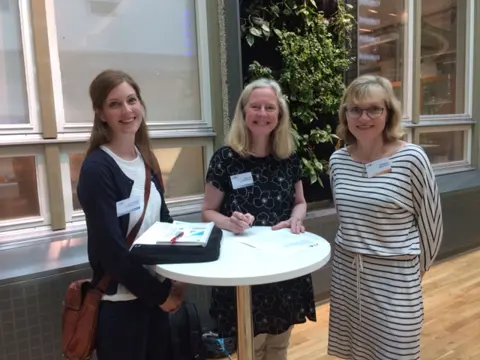
Precision medicine is most often considered in the context of using genetic diversity to predict which patients are more likely to respond favourably to medicines. However, it can also be used to predict which patients are more likely to respond unfavourably - in other words, to present adverse drug reactions (ADRs). Identifying individual differences in genes, environment and lifestyle could explain why some people experience rare ADRs, while others do not. Given the relevance of precision medicine to pharmacovigilance, it was fitting of UMC staff to take part in this year’s AIMday discussions.
The AIMday concept was developed by Uppsala University Innovation in 2008, and has since been held at Uppsala University several times a year. Organisations define the programme of the meeting by raising questions they would like to discuss with academic researchers for an hour. The session starts with a brief presentation of the background to the question, followed by discussions on the topic where knowledge is exchanged and new perspectives are raised. The purpose of the discussion is not necessarily to come up with solutions to the issue at hand, but to allow organisations and researchers to connect and explore further collaboration options to answer the question.

Five academic scientists participated in the discussion led by Rebecca Chandler, Lovisa Sandberg and Kristina Star from the UMC Research department. As a background to the question raised, UMC staff gave examples of published safety signals where further exploration to determine individual-level risks would be desirable. “The short face-to-face session with researchers in the field, all enthusiastically discussing our question, was truly inspirational,” Lovisa Sandberg said. “It helped us understand where research in this area is at today, where the challenges are and that international collaborations are essential.”
Dr Mia Wadelius, professor in clinical pharmacogenomics at Uppsala University and scientific director of Swedegene, was among those who joined the discussion. Swedegene is a national biobank and phenotype resource centre for ADRs, located at Uppsala University Hospital and Uppsala University. The centre collaborates with the Swedish Medical Products Agency and has ethical approval to collect information from individuals who experience adverse reactions to medicines. In order to detect genetic risk factors for well-characterized ADRs, the patients’ DNA is collected and sequenced to enable genome-wide association studies. Unfortunately, it is difficult to find enough cases of rare serious reactions within one country alone. Multi-national data is most likely needed to explore genetic risk factors for rare ADRs, and this is an area that would require further research and evaluation.
What the member countries of the WHO Programme for International Drug Monitoring and the UMC might contribute to such scientific development remains an open question.




